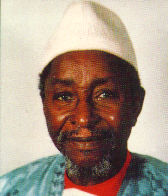|
Craig White's authors |
 |
Amadou Hampâté Bâ (c. 1900-1991) |
 |
Amadou
Hampâté Bâ (c. 1900-1991) was a well-known Malian diplomat and author of the
last half of the twentieth century. His fiction and non-fiction books in French
are widely respected as sources of information and insight on West African
history, religion, literature and culture, and life.
From the time of
his youth, Mr. Bâ was a student of the Malian Sufi Master
Tierno Bokar. Shaykh Bokar has become known as "the sage of Bandiagara,"
the town in
Amadou
Hampâté Bâ was born to an aristocratic Fula family in Bandiagara, the largest
city in Dogon territory and the ancient capital of the Masina Empire. After his
father's death, he was adopted by his mother's second husband, Tidjani Amadou
Ali Thiam of the Tukolor ethnic group. He first met his spiritual leader, Tierno
Bokar, while attending the Koranic school run by Bokar.
In 1942, he was appointed to the Institut Français d’Afrique Noire (IFAN, French
Institute of Black Africa) in
His term in the
executive council ended in 1970, and he devoted the remaining years of his life
to research and writing. Of his books that have been translated into English,
the best known is probably his novel, The Fortunes
of Wangrin.
